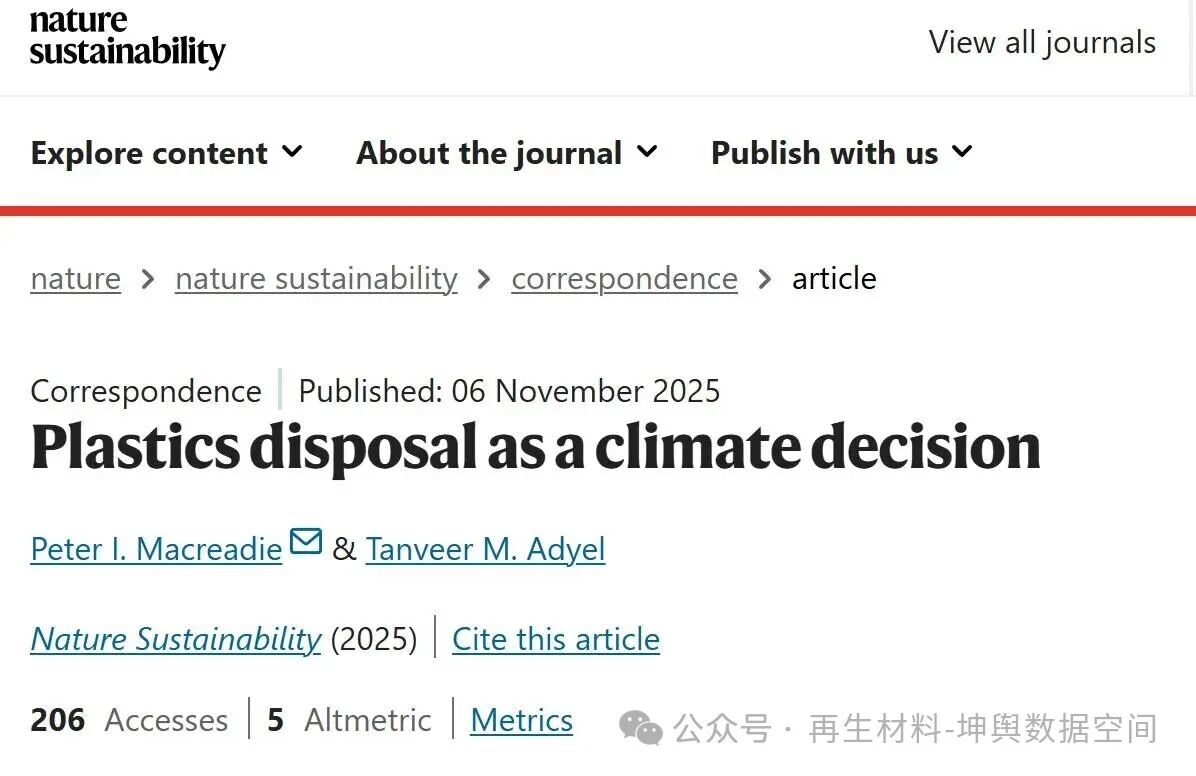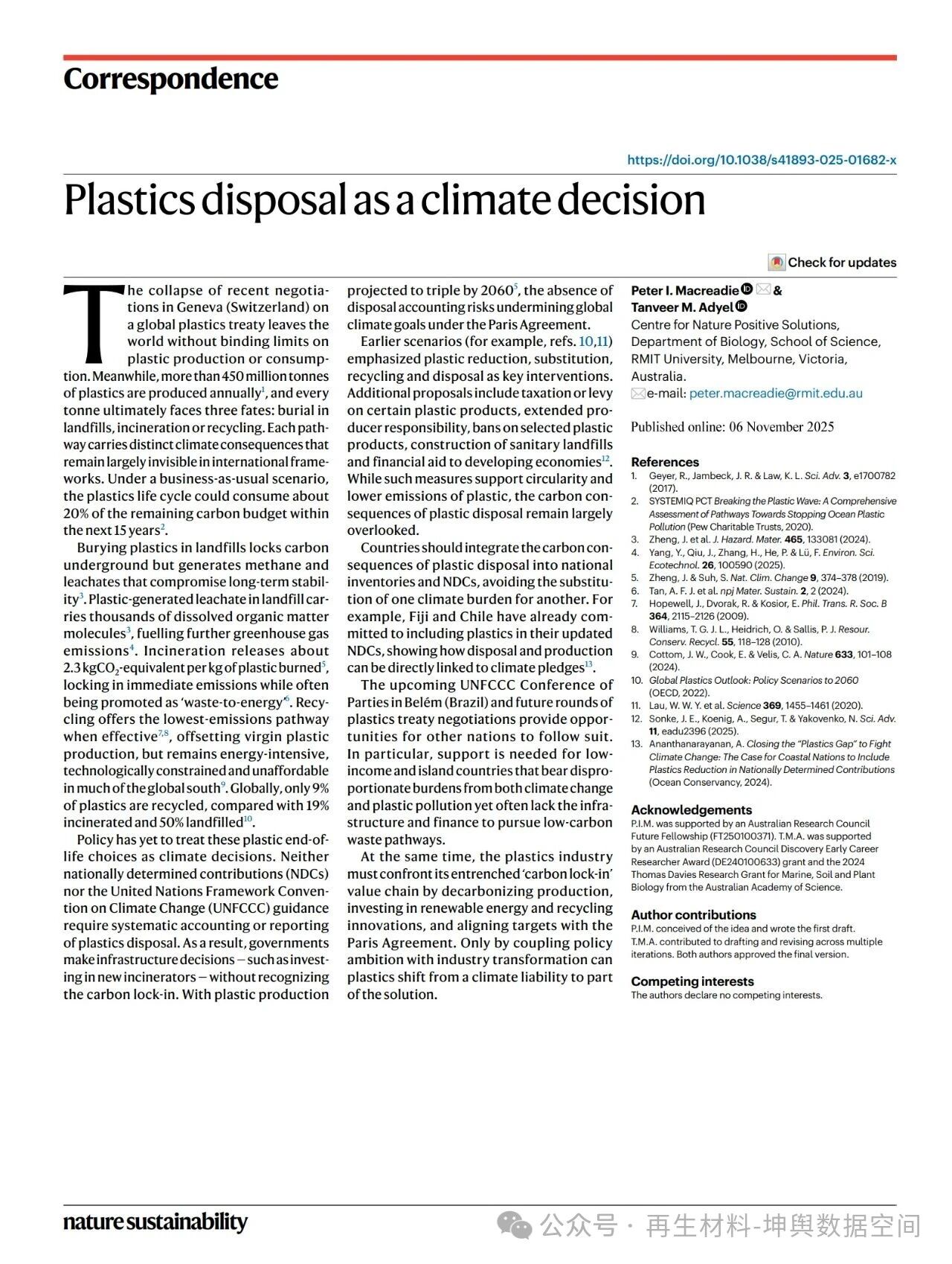Nature Sustainability | Plastic Management: A Crucial Climate Decision
Recently, the top international academic journal *Nature Sustainability* published a "correspondence article" titled "Plastic Disposal: A Critical Climate Decision". The article clearly points out that with the breakdown of global plastic treaty negotiations, countries around the world are facing a neglected climate crisis: the final disposal methods of plastics (landfilling, incineration, or recycling) constitute a significant climate decision, yet their carbon emissions have never been formally included in national climate commitments. The article warns that this policy blind spot is putting global climate goals at serious risk.

The recent collapse of negotiations on a global plastic treaty in Geneva, Switzerland, has left the world without binding restrictions on plastic production or consumption. Meanwhile, more than 450 million tons of plastic are produced globally each year, and every ton of plastic ultimately faces three fates: landfilling, incineration, or recycling. Each disposal route comes with unique climate consequences, which have largely been ignored in international frameworks. Under a "business-as-usual" scenario, the entire life cycle of plastics could consume approximately 20% of the remaining carbon budget over the next 15 years.
Although landfilling plastic underground can sequester carbon, it produces methane and leachate, thereby undermining its long-term stability. The leachate generated by plastic in landfills contains thousands of dissolved organic molecules, which further contribute to greenhouse gas emissions. Incinerating each kilogram of plastic releases approximately 2.3 kilograms of carbon dioxide equivalents, which locks in immediate emissions but is often promoted as "waste-to-energy". When recycling is effective, it provides the lowest carbon emission pathway and can offset the production of virgin plastic. However, the recycling process is still energy-intensive, constrained by technology, and costly in many regions of the Global South. Globally, only 9% of plastic is recycled, 19% is incinerated, and 50% is landfilled.
Policies have not yet regarded these options for end-of-life plastic management as climate decisions. Neither the Nationally Determined Contributions (NDCs) nor the guidelines of the United Nations Framework Convention on Climate Change (UNFCCC) require systematic accounting or reporting of plastic waste management. As a result, when governments make infrastructure decisions—such as investing in new incineration plants—they fail to recognize the "carbon lock-in" effect involved. With plastic production projected to triple by 2060, the lack of accounting for plastic waste management could undermine the global climate goals under the Paris Agreement.
Early scenarios emphasized that reducing plastic emissions, substitution, recycling, and disposal are key intervention measures. Additional proposals include taxing or levying fees on certain plastic products, extending producer responsibility, banning some plastic products, constructing sanitary landfills, and providing financial assistance to developing economies. Although these measures contribute to circularity and reducing plastic emissions, the carbon consequences of plastic disposal remain largely overlooked.
Countries should incorporate the carbon consequences of plastic disposal into their national inventories and Nationally Determined Contributions (NDCs) to avoid replacing one climate burden with another. For example, Fiji and Chile have committed to including plastic issues in their updated NDCs, demonstrating how handling and production can be directly linked to climate commitments.
The upcoming UNFCCC Conference of the Parties (COP) in Belém, Brazil, and future rounds of plastic treaty negotiations present opportunities for other countries to follow suit. In particular, support needs to be provided to low-income and island nations, which bear a disproportionate burden of climate change and plastic pollution but often lack the infrastructure and funds to pursue low-carbon waste management pathways.
At the same time, the plastics industry must confront its deeply entrenched "carbon lock-in" value chain and achieve transformation by decarbonizing production, investing in renewable energy and recycling innovations, and aligning its goals with the Paris Agreement. Only by combining policy ambition with industrial transformation can plastics shift from being a climate liability to part of the solution.
Original text:

Source: Official Account: Recycled Materials - Kunyu Data Space




